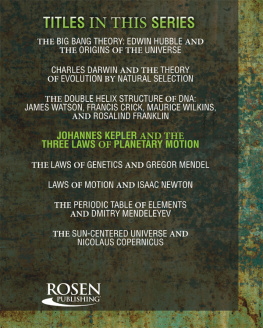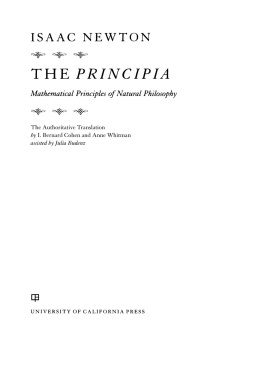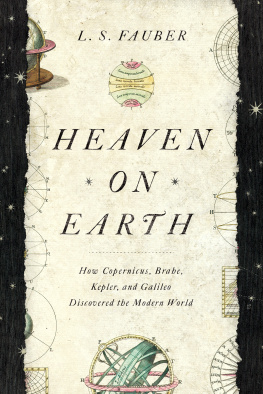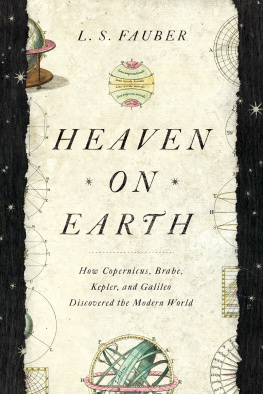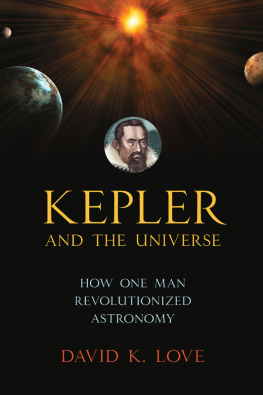K EPLER
K EPLER
MAX CASPAR
TRANSLATED AND EDITED BY C. DORIS HELLMAN
With a New Introduction and References by
Owen Gingerich
Bibliographical Citations by
Owen Gingerich and Alain Segonds
DOVER PUBLICATIONS, INC.
NEW YORK
Copyright
Introduction to the Dover Edition and Index of Subjects and Places copyright 1993 by Owen Gingerich.
Bibliographical References and Bibliographical Citations copyright 1993 by Owen Gingerich and Alain Segonds.
All rights reserved.
Bibliographical Note
This Dover edition, first published in 1993, is a corrected and expanded edition of the work originally published in 1959 by Abelard-Schuman Limited, London. New to this edition are the Introduction to the Dover Edition, Bibliographical References (which replace the section of that name in the 1959 edition), Bibliographical Citations and Index of Subjects and Places.
Library of Congress Catalogingin-Publication Data
Caspar, Max, 18801956.
[Johannes Kepler. English]
Kepler / by Max Caspar ; translated and edited by C. Doris Hellman; with a new introduction and references by Owen Gingerich and bibliographical citations by Owen Gingerich and Alain Segonds.
p. cm.
Originally published: London ; New York: Abelard-Schuman, c1959. (Life of science library ; 36)
Includes bibliographical references and index.
eISBN-13: 978-0-486-15175-5
1. Kepler, Johannes, 15711630. 2. AstronomersGermany Biography. I. Hellman, Clarisse Doris, 1910 II. Title.
QB36.K4C33 1993
520.92dc20
[B]
93-14292
CIP
Manufactured in the United States by Courier Corporation
67605606 2014
www.doverpublications.com
INTRODUCTION TO THE DOVER EDITION
I N 1959 the distinguished novelist Arthur Koestler surprised his readers with The Sleepwalkers, a departure from his accustomed literary genre. In a nonfictional book that explored the psychology of creativity and discovery, Koestler composed as his centerpiece an engaging, and sometimes exasperating, biography of Johannes Kepler. Koestler had long held an interest in scientific matters, having worked before World War II as science editor for a newspaper chain. When he learned about Keplers fascinating personality and remarkable achievements, Koestler became increasingly vexed that the public knew so little of the German astronomers life and works. While Kepler and Galileo were the two giants on whose shoulders Newton had stood, why was the name of one of the giants familiar to every schoolboy, but the second known to only a small number of intellectuals? Koestler deliberately set out to rectify this imbalance with a polemical work designed to supplement the meagre information then available in English about Kepler. The appearance of Koestlers well-written account sparked considerable interest in the sixteenth-century astronomer-cosmologist.
Before the year was out, however, Koestlers readers were able to discover the source of much of his information: Max Caspars Kepler was finally published in English translation. Caspar was eminently qualified to write the standard biography. Like Kepler himself, Caspar was born in southern Germany (in 1880), had been trained in both theology and mathematics, and had studied at the University of Tbingen. In 1923 he published a German translation of Keplers Mysterium cosmographicum, and he followed this in 1929 with a German version of the important Astronomia nova, in which Kepler had enunciated his first two laws of planetary motion. He became a co-worker in Walther von Dycks project to prepare a new collected edition of Keplers works, and, as a preliminary, the two published a German edition of some of Keplers letters. After von Dycks death, Caspar continued amassing an archive of 15,000 photocopies of all known Keplerian manuscripts, and in 1937 he brought out the initial volume of the Johannes Kepler Gesammelte Werke. By the time he produced the first edition of his major biography of Kepler (in 1948), he had completed three more volumes of the Gesammelte Werke as well as a translation of Harmonice mundi, and by then five more volumes of Keplerian correspondence were in the works.
It is interesting to compare Koestlers shorter biography with Caspars, which has become the standard account of Kepler. With the sure hand of an accomplished novelist, Koestler rearranged and juxtaposed his materials, telling a compelling story but one strongly colored by his own particular predilections. Caspars Kepler, too, has its drama: there are pages that amaze and passages that can bring the reader to tears. But his biases are more modest, and generally not enhanced by selectivity. Caspars book is a straightforward march through the thickets of Kepleriana. Each of Keplers books is described in perceptive, if not technical, detail. The religious turmoil of the age and Keplers own anguish are graphically conveyed. Laid out before the reader is an extensive recounting of Katharina Keplers witchcraft trial, which exhibits the whole range of human fear, greed, and stupidity.
For good reason, then, Caspars Kepler, in any language, is the closest we have to a definitive account. Thus it is all the more strange that this treatment, so rich in extensive quotations, was prepared with virtually no footnotes or citations. Its translator, the late C. Doris Hellman, remarked on this deficiency, but elected to indicate only a few of the sources. For several decades I have been marking the references in the margins of my copy, and in preparation for this Dover edition, Alain Segonds and I have systematically completed this documentation. We managed to find essentially all of the appropriate sourcesnearly 1200and these have been listed by page and line in the Bibliographical Citations supplement at the end of the book. I have also included as Bibliographical References some of the major items in the growing literature about Kepler (this replaces the small section in the earlier editions), and, at the end, I have added a new Index of Subjects and Places.
The work of Segonds and myself was ably assisted by colleagues who found several of the more elusive citations, or drew our attention to relevant references. We particularly thank Volker Bialas, Mary Ellen Bowden, William Donahue, Judith Field, Friedrich Seck, and most especially James Voelkel, as well as the late Eric Aiton who made the new translation of Keplers Harmony of the World available to us.
Harvard-Smithsonian Center for Astrophysics,
September, 1992
Owen Gingerich
Editors Foreword
When Max Caspar died on September 1, 1956, the world lost the recognized dean of Kepler scholars. Nearly two-thirds of Professor Caspars seventy-six years were devoted to assembling, cataloguing, describing, analyzing and editing the works of Johannes Kepler. Thirteen volumes of the monumental edition of Keplers works, begun by the late Walther von Dyck and continued by Professor Caspar, have now been published and it is hoped that the other volumes will soon follow. This edition makes Keplers works and Professor Caspars valuable comments available to scholars the world over.
The definitive biography of Johannes Kepler which we now have before us first appeared in German in 1948 (reprinted in 1950 and in 1958) and is a by-product of Professor Caspars immense erudition. It is unfortunate that he did not live to see its translation into English. Until 1948 the best biography of Kepler was that published in 1871 in Latin in the Frisch edition of Keplers Opera Omnia, and which Professor Caspars scholarship has done so much to supplement. Published in German, the new biography had but a limited audience. There are many readers of English for whom it was inaccessible and therefore it seemed eminently desirable to translate Professor Caspars work. In doing so I have tried to retain the flavor of his language and I have not shortened the passages about Keplers mothers witch trial and about the religious conflicts as I had originally intended to do. In fact, I have not altered anything but have put all my comments into the footnotes.
Next page



